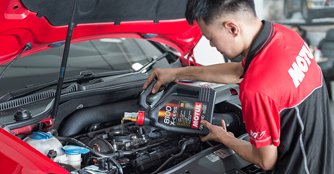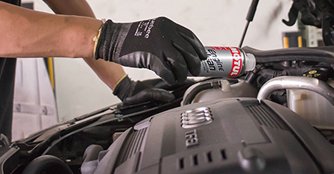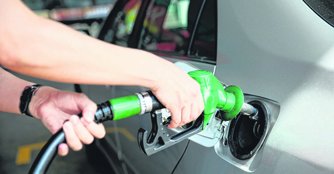Six car myths that are burning a hole in your pocket
29 Mar 2018|70,979 views
How much are you really spending on your car? Are you being fed rumours that cost you than you should? Not to worry, we've got you covered with these six car myths that are burning a hole in your pocket.
1. 5,000km is the magic number to change your engine oil
We've already busted this myth, thanks to Motul's help with these eight engine oil misconceptions you shouldn't believe. But here's a refresher, just in case.
Changing your engine oil every 5,000km is not just unnecessary, it also does a number on your wallet. Motul recommends an oil change interval of between 8,000km and 10,000km to ensure your engine performs at its best. The exact interval, however, depends heavily on factors such as your engine, the type of oil you use, and, of course, your driving style.

 If you're not driving like a maniac, changing your engine oil between 8,000km and 10,000km is perfectly fine
If you're not driving like a maniac, changing your engine oil between 8,000km and 10,000km is perfectly fine
2. Additives are like steroids for your car
Fuel and engine oil additives are commonly believed to improve your vehicle's performance, in a sense that they supposedly provide better fuel economy and throttle response, as well as clean out the carbon deposits in your engine and make it a whole lot smoother.
The thing is, there's no concrete evidence to prove that they actually improve your car's performance in these areas. And it could just be a placebo on your part. That said, additives aren't actually harmful to your car, they just don't provide enough benefits to justify their cost.
3. Higher octane petrol is always better
Not all cars require a 98 octane rating petrol. If yours isn't one that can only seat two with no luggage, it will probably do just fine on a 95, or even a 92 in some cases. Now, we're not telling you to avoid the 'good stuff' like the plague.
Just keep in mind that spending almost double the amount of money to get the 'best performance' for your Japanese crossover will burn a hole in your pocket so deep you'll be able to see your creamy white thighs from a mile away.
4. Servicing and repairs should always be done at your Authorised Distributor (AD) even after your warranty expires
Don't get us wrong, we're not saying ADs are evil corporations that are out to suck you dry.
1. 5,000km is the magic number to change your engine oil
We've already busted this myth, thanks to Motul's help with these eight engine oil misconceptions you shouldn't believe. But here's a refresher, just in case.
Changing your engine oil every 5,000km is not just unnecessary, it also does a number on your wallet. Motul recommends an oil change interval of between 8,000km and 10,000km to ensure your engine performs at its best. The exact interval, however, depends heavily on factors such as your engine, the type of oil you use, and, of course, your driving style.

2. Additives are like steroids for your car
Fuel and engine oil additives are commonly believed to improve your vehicle's performance, in a sense that they supposedly provide better fuel economy and throttle response, as well as clean out the carbon deposits in your engine and make it a whole lot smoother.
The thing is, there's no concrete evidence to prove that they actually improve your car's performance in these areas. And it could just be a placebo on your part. That said, additives aren't actually harmful to your car, they just don't provide enough benefits to justify their cost.
3. Higher octane petrol is always better
Not all cars require a 98 octane rating petrol. If yours isn't one that can only seat two with no luggage, it will probably do just fine on a 95, or even a 92 in some cases. Now, we're not telling you to avoid the 'good stuff' like the plague.
Just keep in mind that spending almost double the amount of money to get the 'best performance' for your Japanese crossover will burn a hole in your pocket so deep you'll be able to see your creamy white thighs from a mile away.
4. Servicing and repairs should always be done at your Authorised Distributor (AD) even after your warranty expires
Don't get us wrong, we're not saying ADs are evil corporations that are out to suck you dry.
But they tend to charge more than your neighbourhood workshops do, and for good reason. ADs offer the kind of assurance and aftersales service that you wouldn't usually get at a typical ah beng, ah seng joint.
However, if you're not rolling around in cash, you probably wouldn't want to keep going back to your AD every time your engine checklight comes on.
5. You have to stick with your insurance plan for the whole year
Insurance plans are charged annually and there's a misconception that once you've paid for the plan, you're stuck with it for the rest of the year. Good news, you're not.
For the most part, you are entitled to terminate your current insurance plan at any time. But there's usually a catch (there's always a catch). Insurance companies typically charge a cancellation fee so it's best to enquire beforehand.
However, it just may be worth it to terminate your current insurance scheme if you chance upon a significantly lower-priced plan, or if you find out your insurer is pretty dodgy when it comes to claims.

 Terminating your insurance plan before it expires is possible, but it usually comes with a catch, so be careful and do your homework
Terminating your insurance plan before it expires is possible, but it usually comes with a catch, so be careful and do your homework
6. Your insurance covers you for anything and everything
Even if your insurance scheme is a comprehensive one, it will not cover you in certain situations. For example, if you zhng your car and do not declare any modifications to your insurer, you can say bye-bye to your accident claims.
And, obviously, no insurance company will cover you if you're involved in a race and wreck your ride. You see, insurance companies have underwriters whose sole job is to find out everything there is to know about your accident.
And if they find out that you were the cause of it, in any way, you'll have to fork out your own hard-earned cash for your repairs.
If you have no idea what comprehensive cover; third party; or third party, fire and theft mean; not to worry. Here's what you must know about car insurance schemes in Singapore.
Here are some related articles that might interest you
Ultimate Guide to Car Insurance in Singapore
7 ways to reduce car running costs
Want cheap car insurance? Don't auto-renew your car insurance!
9 ways to lower your car insurance premiums
Do fuel injector cleaners and octane boosters work?


However, if you're not rolling around in cash, you probably wouldn't want to keep going back to your AD every time your engine checklight comes on.
5. You have to stick with your insurance plan for the whole year
Insurance plans are charged annually and there's a misconception that once you've paid for the plan, you're stuck with it for the rest of the year. Good news, you're not.
For the most part, you are entitled to terminate your current insurance plan at any time. But there's usually a catch (there's always a catch). Insurance companies typically charge a cancellation fee so it's best to enquire beforehand.
However, it just may be worth it to terminate your current insurance scheme if you chance upon a significantly lower-priced plan, or if you find out your insurer is pretty dodgy when it comes to claims.

6. Your insurance covers you for anything and everything
Even if your insurance scheme is a comprehensive one, it will not cover you in certain situations. For example, if you zhng your car and do not declare any modifications to your insurer, you can say bye-bye to your accident claims.
And, obviously, no insurance company will cover you if you're involved in a race and wreck your ride. You see, insurance companies have underwriters whose sole job is to find out everything there is to know about your accident.
And if they find out that you were the cause of it, in any way, you'll have to fork out your own hard-earned cash for your repairs.
If you have no idea what comprehensive cover; third party; or third party, fire and theft mean; not to worry. Here's what you must know about car insurance schemes in Singapore.
Here are some related articles that might interest you
Ultimate Guide to Car Insurance in Singapore
7 ways to reduce car running costs
Want cheap car insurance? Don't auto-renew your car insurance!
9 ways to lower your car insurance premiums
Do fuel injector cleaners and octane boosters work?

Sgcarmart
Get up to 20% off and $300 cashback when you renew with select car insurance!
Compare car insurance effortlessly with Sgcarmart. Get exclusive offers, discounts and cashback when renewing car insurance with our partner.
- Auto comparison for your future renewal quotes
- We provide claims support for your accident claims
How much are you really spending on your car? Are you being fed rumours that cost you than you should? Not to worry, we've got you covered with these six car myths that are burning a hole in your pocket.
1. 5,000km is the magic number to change your engine oil
We've already busted this myth, thanks to Motul's help with these eight engine oil misconceptions you shouldn't believe. But here's a refresher, just in case.
Changing your engine oil every 5,000km is not just unnecessary, it also does a number on your wallet. Motul recommends an oil change interval of between 8,000km and 10,000km to ensure your engine performs at its best. The exact interval, however, depends heavily on factors such as your engine, the type of oil you use, and, of course, your driving style.

 If you're not driving like a maniac, changing your engine oil between 8,000km and 10,000km is perfectly fine
If you're not driving like a maniac, changing your engine oil between 8,000km and 10,000km is perfectly fine
2. Additives are like steroids for your car
Fuel and engine oil additives are commonly believed to improve your vehicle's performance, in a sense that they supposedly provide better fuel economy and throttle response, as well as clean out the carbon deposits in your engine and make it a whole lot smoother.
The thing is, there's no concrete evidence to prove that they actually improve your car's performance in these areas. And it could just be a placebo on your part. That said, additives aren't actually harmful to your car, they just don't provide enough benefits to justify their cost.
3. Higher octane petrol is always better
Not all cars require a 98 octane rating petrol. If yours isn't one that can only seat two with no luggage, it will probably do just fine on a 95, or even a 92 in some cases. Now, we're not telling you to avoid the 'good stuff' like the plague.
Just keep in mind that spending almost double the amount of money to get the 'best performance' for your Japanese crossover will burn a hole in your pocket so deep you'll be able to see your creamy white thighs from a mile away.
4. Servicing and repairs should always be done at your Authorised Distributor (AD) even after your warranty expires
Don't get us wrong, we're not saying ADs are evil corporations that are out to suck you dry.
1. 5,000km is the magic number to change your engine oil
We've already busted this myth, thanks to Motul's help with these eight engine oil misconceptions you shouldn't believe. But here's a refresher, just in case.
Changing your engine oil every 5,000km is not just unnecessary, it also does a number on your wallet. Motul recommends an oil change interval of between 8,000km and 10,000km to ensure your engine performs at its best. The exact interval, however, depends heavily on factors such as your engine, the type of oil you use, and, of course, your driving style.

2. Additives are like steroids for your car
Fuel and engine oil additives are commonly believed to improve your vehicle's performance, in a sense that they supposedly provide better fuel economy and throttle response, as well as clean out the carbon deposits in your engine and make it a whole lot smoother.
The thing is, there's no concrete evidence to prove that they actually improve your car's performance in these areas. And it could just be a placebo on your part. That said, additives aren't actually harmful to your car, they just don't provide enough benefits to justify their cost.
3. Higher octane petrol is always better
Not all cars require a 98 octane rating petrol. If yours isn't one that can only seat two with no luggage, it will probably do just fine on a 95, or even a 92 in some cases. Now, we're not telling you to avoid the 'good stuff' like the plague.
Just keep in mind that spending almost double the amount of money to get the 'best performance' for your Japanese crossover will burn a hole in your pocket so deep you'll be able to see your creamy white thighs from a mile away.
4. Servicing and repairs should always be done at your Authorised Distributor (AD) even after your warranty expires
Don't get us wrong, we're not saying ADs are evil corporations that are out to suck you dry.
But they tend to charge more than your neighbourhood workshops do, and for good reason. ADs offer the kind of assurance and aftersales service that you wouldn't usually get at a typical ah beng, ah seng joint.
However, if you're not rolling around in cash, you probably wouldn't want to keep going back to your AD every time your engine checklight comes on.
5. You have to stick with your insurance plan for the whole year
Insurance plans are charged annually and there's a misconception that once you've paid for the plan, you're stuck with it for the rest of the year. Good news, you're not.
For the most part, you are entitled to terminate your current insurance plan at any time. But there's usually a catch (there's always a catch). Insurance companies typically charge a cancellation fee so it's best to enquire beforehand.
However, it just may be worth it to terminate your current insurance scheme if you chance upon a significantly lower-priced plan, or if you find out your insurer is pretty dodgy when it comes to claims.

 Terminating your insurance plan before it expires is possible, but it usually comes with a catch, so be careful and do your homework
Terminating your insurance plan before it expires is possible, but it usually comes with a catch, so be careful and do your homework
6. Your insurance covers you for anything and everything
Even if your insurance scheme is a comprehensive one, it will not cover you in certain situations. For example, if you zhng your car and do not declare any modifications to your insurer, you can say bye-bye to your accident claims.
And, obviously, no insurance company will cover you if you're involved in a race and wreck your ride. You see, insurance companies have underwriters whose sole job is to find out everything there is to know about your accident.
And if they find out that you were the cause of it, in any way, you'll have to fork out your own hard-earned cash for your repairs.
If you have no idea what comprehensive cover; third party; or third party, fire and theft mean; not to worry. Here's what you must know about car insurance schemes in Singapore.
Here are some related articles that might interest you
Ultimate Guide to Car Insurance in Singapore
7 ways to reduce car running costs
Want cheap car insurance? Don't auto-renew your car insurance!
9 ways to lower your car insurance premiums
Do fuel injector cleaners and octane boosters work?


However, if you're not rolling around in cash, you probably wouldn't want to keep going back to your AD every time your engine checklight comes on.
5. You have to stick with your insurance plan for the whole year
Insurance plans are charged annually and there's a misconception that once you've paid for the plan, you're stuck with it for the rest of the year. Good news, you're not.
For the most part, you are entitled to terminate your current insurance plan at any time. But there's usually a catch (there's always a catch). Insurance companies typically charge a cancellation fee so it's best to enquire beforehand.
However, it just may be worth it to terminate your current insurance scheme if you chance upon a significantly lower-priced plan, or if you find out your insurer is pretty dodgy when it comes to claims.

6. Your insurance covers you for anything and everything
Even if your insurance scheme is a comprehensive one, it will not cover you in certain situations. For example, if you zhng your car and do not declare any modifications to your insurer, you can say bye-bye to your accident claims.
And, obviously, no insurance company will cover you if you're involved in a race and wreck your ride. You see, insurance companies have underwriters whose sole job is to find out everything there is to know about your accident.
And if they find out that you were the cause of it, in any way, you'll have to fork out your own hard-earned cash for your repairs.
If you have no idea what comprehensive cover; third party; or third party, fire and theft mean; not to worry. Here's what you must know about car insurance schemes in Singapore.
Here are some related articles that might interest you
Ultimate Guide to Car Insurance in Singapore
7 ways to reduce car running costs
Want cheap car insurance? Don't auto-renew your car insurance!
9 ways to lower your car insurance premiums
Do fuel injector cleaners and octane boosters work?

Sgcarmart
Get up to 20% off and $300 cashback when you renew with select car insurance!
Compare car insurance effortlessly with Sgcarmart. Get exclusive offers, discounts and cashback when renewing car insurance with our partner.
- Auto comparison for your future renewal quotes
- We provide claims support for your accident claims























